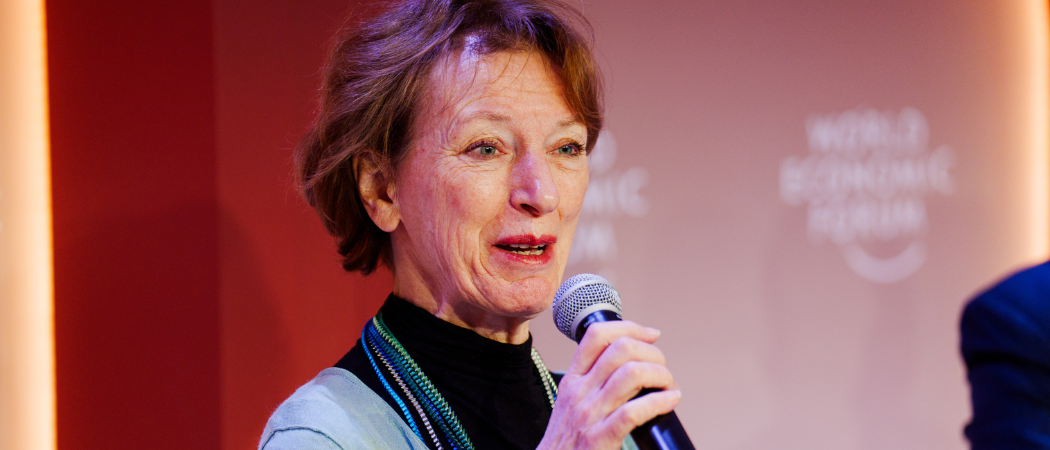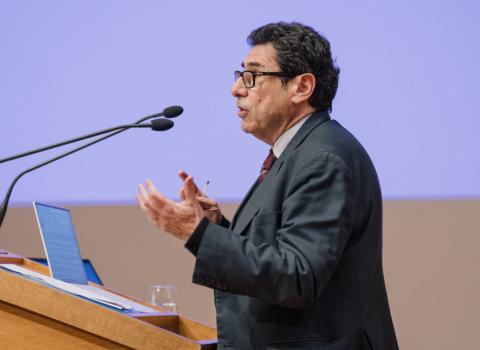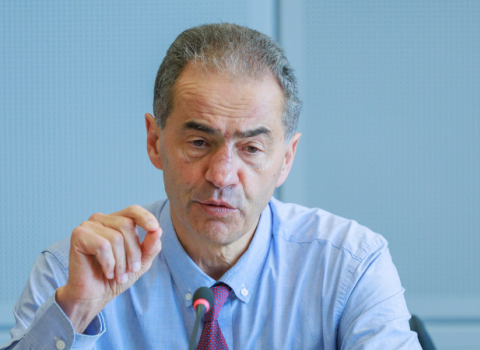European Research Council president Maria Leptin asks Commission to give EU’s leading frontier science fund more independence

Maria Leptin, president of the European Research Council. Photo credits: Boris Baldinger / World Economic Forum
The European Research Council (ERC) Scientific Council wants the EU’s fundamental research fund to become independent from the European Commission, with a stable long-term budget.
In a surprise move on June 17, the council sent a proposal to create an independent ERC to Commission president Ursula von der Leyen and research commissioner Ekaterina Zaharieva. So far, the letter has not been made public.
“The Scientific Council has requested a permanent, standalone structure within the Framework Programme, with its own regulation, a scientific council appointed by the Commission as its governing board, and staff inherited from the executive agency,” ERC president Maria Leptin confirmed to Science|Business.
On paper, the ERC already has a high degree of independence from the Commission. It draws up its own work programmes and determines the types of grants and budgets available to applicants.
The grants are managed by a dedicated ERC executive agency whose work is further overseen by a council of leading scientists. Executive agencies are created for a limited time to take care of specific tasks associated with EU programmes.
This arrangement allows the ERC to commit to excellent science rather than follow the political priorities of the day. Leptin and other scientists have continually argued that this is key to the ERC’s success, allowing it to generate ground-breaking, Nobel-winning science.
Doubts about the future of this approach have grown in recent months as the Commission prepares to merge its funding programmes into a massive new Competitiveness Fund. The ERC is expected to play a part in delivering this competitiveness agenda. “The ERC is not living in a vacuum,” Commission’s research chief Marc Lemaître said in February.
This is why the ERC decided to make take matters into its own hands. While the Scientific Council supports the push for competitiveness and a simplified EU budget, “in the absence of concrete details on the architecture of the next Multiannual Financial Framework, including the Competitiveness Fund and the Framework Programme to which it will be tightly interconnected, we have decided to be proactive and make our own proposal,” said Leptin.
A more independent set-up would show Europe’s commitment to scientific freedom and put it on an equal footing with other major science funders, she went on. Giving the Scientific Council the ability to fully tailor ERC support to European scientists would also mean it could make an even greater contribution to EU competitiveness.
“By contrast, we have concerns that merging the ERC into a single pipeline of support with a single rule book, covering everything from grants to individual researchers and start-ups, to debt and equity financing for industrial deployment and manufacturing, will inhibit the ERC’s operations,” Leptin said.
Staff concerns
The Commission, which is currently drafting the proposal for the upcoming Competitiveness Fund and the next long-term EU budget, has yet to respond to the ERC’s request.
But the ERC agency is already preparing its staff for the potential changes a shift to a more independent model would bring. “This is very important to the Scientific Council who count on the skill and professionalism of the current staff,” Leptin said.
Right after sending the proposal to von der Leyen and Zaharieva, Leptin addressed staff, reassuring them that concerns over staff contracts, job security and the geographic location of the ERC will be listened to.
Regarding location, Leptin confirmed that the Scientific Council wants to keep the ERC headquartered in Brussels.
Modelled on the EIT?
It is unclear what exact structure the ERC Scientific Council has proposed to the Commission. The only other Horizon Europe programme with similar independence is the European Institute of Innovation and Technology (EIT), based in Budapest.
In common with the ERC Scientific Council request, the EIT is an independent body and, has a governing board and its own regulation, but functions within the EU Framework Programmes for research.
Related articles
- Research ministers urged to defend ERC independence and FP10
- ERC should contribute more to competitiveness, says EU research chief
- European Research Council needs to remain independent in FP10, Maria Leptin says
The proposal received a mixed response from Christian Ehler, an MEP with the European People’s Party and a prominent voice on research policy in the European Parliament. Any reforms should not stop with the ERC, he suggested.
“The Commission needs to be put at more of a distance from the day-to-day implementation of the Framework Programmes,” Ehler told Science|Business. “We should learn from successful structures in the member states where often research funding is funnelled through specialised agencies with expertise and freedom to determine the calls and project selection."
Mostafa Shawrav, executive director of the Marie Curie Alumni Association, would also be happy to see reforms go further. Earlier this month, he told Science|Business the association was brainstorming a new governance model for the Marie Skłodowska-Curie Actions, which supports fundamental science by training postdoctoral scientists.
“For Europe to lead in research, [its fundamental research programmes] must have the independence needed for groundbreaking work,” he told Science|Business. “It's crucial these programmes receive increased, long-term sustained funding and the necessary autonomy to continue attracting top talent and driving research and innovation in Europe.”
Editor's note: this article was updated on 19 June to include Shawrav's comments and clarify Ehler's position.





 A unique international forum for public research organisations and companies to connect their external engagement with strategic interests around their R&D system.
A unique international forum for public research organisations and companies to connect their external engagement with strategic interests around their R&D system.